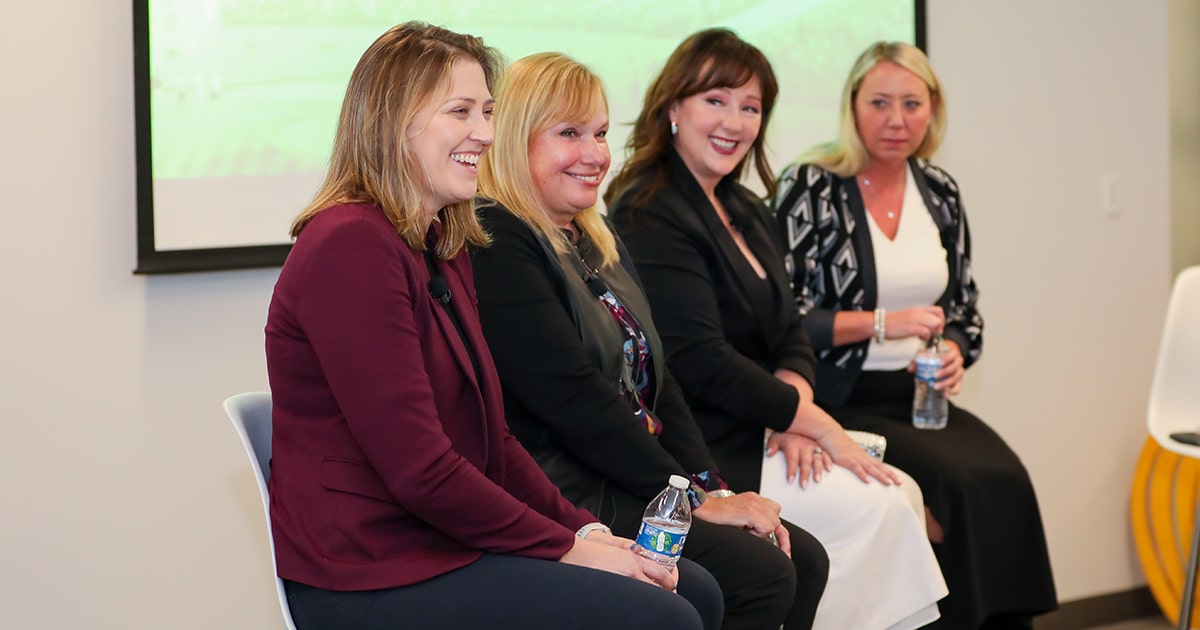

Ambassador Event: Site Selector Panel
Published: 02/14/2024
Site selectors talk about top considerations for business expansion
The priorities of companies seeking expansion are evolving. While cost remains important, it is no longer the primary need for many executives considering growth into different markets. Labor force, utility capacity, real estate availability and quality of life are increasingly important variables for these businesses.
A group of site selectors in Greater Phoenix for the WM Phoenix Open joined the Greater Phoenix Economic Council (GPEC) to discuss top considerations clients face when analyzing expansion opportunities.
The panel consisted of:
- Nicole Bennett, Logistics & Industrial Lead, Americas, Cushman & Wakefield
- Christine Bustamante, Partner, Think LLP
- Kate Crowley, Principal, Baker Tilly
- Alicia Janesko-Hutchings, Site Selection & Incentives Project Manager, Cresa
- Moderator: Ashley Busada, Vice President, Business Development, GPEC
Developing labor and workforce
Historically, some industries found labor studies as beneficial but unnecessary. Now, it’s practically non-negotiable, Bennett said.
“Hardly anyone does a major site selection process without engaging in labor analytics of some sort,” she added.
Labor force consists of a variety of factors including the size and growth trend of a population, ages, incoming migrants and their skill levels, and partnerships between industry players, educational institutions and the state that encourages growth and workforce development.
To capitalize on the full scope of available talent, an increasing number of companies are considering candidates without a degree from a college or university, Bustamante shared. An ideal school system does not just prepare students for colleges — it prepares them with skills that can translate directly and immediately to the workforce.
“Companies really need to take a hard look at paperless candidates. You don’t necessarily need to have your bachelor’s or your PhD or your master’s in order to be effective at your position,” she said.
Equally as important as attracting the employees is retainment. If people are moving to a community or committing to stay long-term, basic needs around housing, transportation and education must be met.
“[Housing affordability] is becoming a limiter for a lot of regions,” Crowley said. “That is something that we look at so significantly now.”
While companies cannot control housing prices, they can find creative means to help employees return to office if increased wages aren’t possible. Perhaps there are ways to ease transportation burdens or offer childcare — which Bennett called the top concern for employees — or school drop-off or eldercare support.
“There’s a variety of things outside of the traditional core that people would see as economic development and tracking labor statistics that people need to be focusing on,” Bustamante said.
Read more: Housing supply in Greater Phoenix
Site readiness
Janesko-Hutchings believes two demand trends of 2023 will continue into 2024: available sites and labor.
“If you don’t have those two things, you don’t have a lot,” she said. “How are [communities and states] answering the questions on the client side, and how are they being creative in their approaches to address both of those issues?”
Site readiness includes the infrastructure to support utility demand. Communities and utility providers must have a plan entering a meeting with a consultant or company and be able to provide solutions to barriers that may arise in discussion.
“States that are coming on strong are ones that work closely with their utility partners and have pre-identified the capacity that will be available at the site,” Janesko-Hutchings said. “What is the plan? If you can come to the table with that conversation with a client, you are miles ahead of the majority of states, in my opinion, that I’ve been working with that have a utility challenge.”
Bustamante advised to ask consultants about ramp-up periods and timeframes for power.
“If I come to you and I say we need 30 megawatts of power, ask better questions. Do you really need 30 megawatts of power in year one, or do you need it in year seven? What is the ramp-up?” she said. “Most of us chat with the engineering folks within our clients’ realms, and so we can ask better questions from them if you’re asking better questions of us.”
Future outlook: Water and ESG
Environmental, Social and Governance (ESG) has risen to the forefront in recent years for a variety of reasons ranging from federal legislation incentivizing ESG goals to young workers demanding social responsibility from employers and an increase in federal direct investment entering the United States from companies prioritizing these virtues.
Crowley said an increasing number of private equity firms are focused on ESG. She is asked about topics including the quality of life, diversity, affordable housing and renewable energy in a community frequently by these clients.
“I’m answering those questions five times more now than I was three years ago,” Crowley said. “I don’t see that slowing down.”
Water has been a heightened topic of discussion in recent years, but leaders in Arizona have spent more than 100 years crafting water guidelines allowing the state to be a good steward while allowing for economic advancement. Today, the state is managing water demands while keeping in accordance with its 1980 Groundwater Management Act and the Colorado River shortage that has affected the southwest.
Leading water planning organizations including Salt River Project and Arizona State University have aligned with GPEC to hold discussions with site selectors and companies to provide water facts and updates.
“I’ve been impressed with the response from the region here about the investments that Greater Phoenix has made in its water infrastructure,” Crowley said. “Hearing it from the local EDO, understanding the investments made from people here on the ground is so important and more meaningful than, honestly, coming from me. When we’ve brought clients here, the response has been really well-received.”
Meet the Panel
Nicole Bennett
Logistics & Industrial Lead, Americas
Cushman & Wakefield
Christine Bustamante
Partner
Think LLP
Kate Crowley
Principal
Baker Tilly
Alicia Janesko-Hutchings
Site Selection & Incentives Project Manager
Cresa
Ashley Busada (Moderator)
Vice President, Business Development
Greater Phoenix Economic Council




